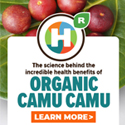
The Chia 'Cheat Sheet' and Ten Raw Chia Recipes
Tuesday, January 08, 2008 by: Angela Stokes
Tags: chia, health news, Natural News
- Hidden poison in your medicine and supplements: How phthalates in capsules are silently attacking your heart, thyroid, and hormones
- Hidden betrayal: Moderna and Pfizer shots hijack immune cells to rewrite mRNA, prolonging spike protein production
- Solar storm sparks concern as supervolcano nears eruption: Could sun's electromagnetic pulse trigger cataclysm?
- Judge rules Kansas vaccine lawsuit against Pfizer must proceed in state court
- Health Ranger Report: Dr. Alphonzo Monzo discusses nanotechnology, 5G and the weaponization of health
- CLIMATE PONZI SCHEME DENIED: Trump begins the exit of the BIGGEST WASTE of money, resources and human lives ever and the climate alarmists are freaking out
- When the storm brings spies: How a top weather app became an agent of surveillance
- Pfizer’s election meddling exposed: Top scientists weaponized science to sway the 2020 vote, so they could benefit from unlawful mandates
- EU court exposes secret Pfizer deal, orders von der Leyen and Bourla to reveal concealed texts
- Breakthrough study reveals how Epstein-Barr and a gene variant heighten multiple sclerosis risk
- X-class solar flare sparks worldwide disruptions, with more storms expected as sunspot turns toward Earth
- The water cure: Unveiling the hidden link between dehydration, obesity, cancer and depression
- Gum bacteria invade heart, trigger dangerous heart rhythm problems
- Coinbase faces $400M fallout after insider-led phishing attack exposes customer data
- Trump’s Gulf tour sparks Iran nuclear deal breakthrough amid regional shifts
- Thwarted ISIS plot on Michigan military base highlights ongoing domestic terror threat
- The hidden dangers of oversleeping: How too much rest harms cognition, fuels depression, and shortens life
- Zero-waste bean cooking: Repurposing pinto bean broth in soups or bread
- WAR ON COGNITION: The Coordinated Assault on Your Brain and How to Defend Yourself Against Every Attack
- Singapore's draconian vaccine mandate: Citizens face jail time for refusing FORCED medical procedures that do HARM
- Big Pharma's Dirty Secret: How Prescription Drugs Are Starving Your Body of Essential Nutrients
- Canada's COVID cover-up: Health officials swore secrecy to protect Trudeau from vaccine scandal
- RED ALERT: Nuclear War Between India and Pakistan Could Trigger Global Catastrophe… full RISK ANALYSIS
- JESUS NEVER SPOKE ENGLISH: Historical facts on why the Bible you’re probably reading has been altered, redacted or hidden from much of its original meaning
- Gene-edited pork sneaks onto your plate: FDA quietly approves CRISPR pigs amid health and ethical concerns
- Silent catastrophe: COVID-19 vaccines linked to plummeting fertility rates, Czech data reveals
- Why All Government Officials and Big Tech CEOs Who Engage in Systematic Viewpoint Censorship Must Be ARRESTED, Prosecuted, and Sentenced to Life in Prison
- Brushing with poison: Study finds toxic heavy metals in 90% of toothpaste brands, including those for children
- Survival basics: 5 Dangerous locations to avoid during an EMP attack
- BBC accused of “political censorship” for shelving Gaza documentary amid mounting pressure
- EU embraces censorship over solutions as energy grid crises spark blackout fears
- Health Ranger Report: Christopher Bjerknes challenges conventional narratives about world history
- Australia’s vaccine cover-up: 35 died same day as COVID shot, but authorities ignored them
- Landmark study of 85 million reveals shocking surge in heart attacks, strokes, and sudden death following the notorious COVID-19 jab
- Hidden poison in your medicine and supplements: How phthalates in capsules are silently attacking your heart, thyroid, and hormones
- The truth about Benzyl Alcohol in beauty products
- The Miraculous Healing Power of DMSO: Nature's Forgotten Cure for Cancer, Pain, and Regeneration
- Biblical truth: God will carry out a “cosmic reset” of Earth and destroy all human civilization with a series of extinction-level cosmic impacts known as The Seven Trumpets, Seven Bowls and Seven Seals
- URGENT REPORT: The China Import Embargo - What to Stockpile Now Before America Runs Out
- The Ultimate Survival Guide to Baking Soda: A Miraculous, Multi-Purpose Remedy for Health, Home, and Emergency Preparedness
- Widespread social and economic unrest: Steve Quayle issues urgent financial warning of imminent asset collapse in new interview with Mike Adams
- Aerosolized bioweapons? Strange “diploid biomasses” falling out of the sky in Florida captured under the microscope
- A call to preserve America’s future: “Defeating Big Government Socialism” by Newt Gingrich
- Stunning Visualization of the Seven Trumpets in the Book of Revelation
- Big Pharma launches “Vaccine Integrity Project” to combat Secretary Kennedy and keep 94 shots going into kids with mandates and liability protections
- World Economic Forum's current downfall exposes legacy of totalitarianism, financial fraud, and crimes against humanity
- Biden regime deployed over 600 grants to fund disinformation agenda, to silence the truth and stifle debate
- The Miraculous Healing Power of Green Tea: Unlocking the Potent Antioxidants That Big Pharma Doesn't Want You to Know About
- The unspoken truth about chemotherapy: These “treatments” create toxic time bombs in your body called CELL-KILLING PARTICLES
- U.S. Government's Bio-War Against America: 15 Historical Medical Horrors Inflicted on the American People by the Government Itself
- A win for free speech: State Department SHUTS DOWN controversial disinformation office
- U.S. demands U.K. protect FREE SPEECH, repeal hate speech authoritarianism, in latest trade deal negotiations
- French rioting demonstrates how gun control laws are failing law-abiding citizens
- Head of L.A. Port warns of incoming plunge in U.S. supply chain, empty shelves and inventory depletion in 5-7 weeks
- Red Cross issues warning to stop blood plasma donations from vaccinated people
- Scientists confirm: GENIUS brain function can be spontaneously unleashed in humans without any apparent cause
- EPA advisor admits the agency is funneling billions to climate groups ahead of Trump’s return to White House
- HYSSOP: What research reveals about the health benefits of this ancient holy herb
- Two containers with completed ballots fall out of truck in Florida
- Newly released JFK files reveal Pentagon's role in creating Lyme disease and covid in the same lab
- Mike Adams releases country western hit single: Goin’ Back in Time is Comin’ Home
- Global leaders unite to clamp down on “misinformation” with UN-backed Cascais Declaration
- BREAKING: 2025 NDAA authorizes mandatory military draft of WOMEN across America… as Pentagon pursues global NUCLEAR war with both Russia and China at the same time
- I Want My Bailout Money – new song released by Mike Adams
- Michael Yon warns of a ZIONIST TAKEOVER in Trump’s second administration
- Ozempic and Wegovy weight loss drugs are injectable LIZARD VENOM PEPTIDES that may unleash a devastating wave of organ failure… side effects align with symptoms of SNAKE BITES
- The Health Ranger releases “Vaccine Zombie” song and music video, using AI-animated zombies for the music video
- BOMBSHELL: DNA testing kits are a SCAM to develop ethnic-specific bioweapons
- These 13 countries just signed an agreement to engineer a global FAMINE by destroying food supply
- Israeli soldiers accused of even more torture and abuse in the West Bank
- RFK Jr. clears key hurdle: Sen. Susan Collins backs controversial HHS nominee, signaling a new era for health policy
- Sermon 30: How Jesus reveals Caesar’s FAKE CURRENCY and FALSE AUTHORITY
"Chia" is actually the Mayan word for strength. The seeds were used by these ancient cultures as mega-energy food, especially for their running messengers, who would carry a small pouch of it with them. Chia has been called 'Indian Running Food' and gives an incredibly 'sustaining' surge of energy. I've definitely noticed for myself the 'running energy' that chia seems to impart. If I eat chia, then run later that day, my endurance and ability to run further is greatly enhanced - pretty impressive stuff.
The chia we sell in our online store is imported from Mexico and is certified organic. In Mexico they say that one tablespoon of chia seeds can sustain a person for 24 hours. Chia also happens to taste great, looks cute (like tiny dinosaur eggs) and is ready to eat really quickly, besides which it has an off-the-scale nutritional profile.
Why would you want to eat Chia?
Chia seeds are said to have:
*2 times the protein of any other seed or grain,
*5 times the calcium of milk, plus boron which is a trace mineral that helps transfer calcium into your bones,
*2 times the amount of potassium as bananas,
*3 times the reported antioxidant strength of blueberries
*3 times more iron than spinach
*copious amounts of omega-3 and omega-6, which are essential fatty acids
They are a complete source of protein, providing all the essential amino acids in an easily digestible form. They are also a fabulous source of soluble fibre. Like flax, chia is highly hydrophilic: the seeds absorb water and create a mucilaginous gel. They can hold 9-12 times their weight in water and they absorb it very rapidly - in under 10 minutes.
One advantage of chia is that because it has such a high antioxidant content, the seeds stay stable for much longer, whereas flax, for example, may turn rancid. Chia seeds can easily be stored dry for 4-5 years without deterioration in flavour, odour or nutritional value. You can substitute chia in any recipe that calls for flax.
The taste of chia is very mild and pleasant. That means you can easily combine it with other foods without changing the taste dramatically. People add chia to their sauces, bread batters, puddings, smoothies and more. The flavour is retained, plus a lot more nutrition is added.
The "Dieter's Dream Food"
Chia has been called a dieter's dream food because when added to foods, it bulks them up, displacing calories and fat without diluting the flavour. Thus, someone can eat a typical serving, yet only consume about half the calories they might have eaten, because the food has been bulked up with chia. PLUS, the eater gets a bellyful of nutrient-rich superfood goodness, which hydrates and sustains them -
it's magic.
What are some other benefits of eating Chia?
* Provides energy
* Boosts strength
* Bolsters endurance
* Levels blood sugar
* Induces weight loss
* Aids intestinal regularity
Chia slows the impact of sugars on the system, if eaten together. Chia gel creates a physical barrier between carbohydrates and the digestive enzymes that break them down, which slows the conversion of carbs into sugar. That means the energy from the food is released steadily, resulting in more endurance. This is clearly of great benefit to diabetics in particular. It also means that I can combine chia with super-sweet tastes like apple juice and not get super-spiked.
Due to the exceptional water-absorption quality of chia, it can help you prolong hydration and retain electrolytes, especially during exertion.
Whole, water-soaked chia seeds are easily digested and absorbed. Their tiny dinosaur-egg-like shells break down quickly. They feel light in the body, yet energising. Their nutrients can be quickly assimilated into the body.
Chia seeds bulk up, then work like an incredible digestive broom, sweeping through your intestinal tract, helping to dislodge and eliminate old accumulated waste in the intestines. Many people find their stools also become more regular once they eat chia.
Chia is a very reasonably priced, concentrated food. Our 1 lb. bags cost $8. 1/3 cup of dry chia seeds (2 ounces) makes about 17 ounces of chia gel. This costs about $1. Depending on how much gel you use, those 17oz will likely last, on average, about four days. That is about 25cents a day.
Chia can be used in so many kinds of recipes - savoury, sweet, it works with anything. You might want to try them in salad dressings, cookie mixtures, smoothies, crackers, ice creams, juices and so on.
Chia seed protein contains no gluten. This makes it ideal for anyone with a gluten sensitivity or simply wanting to find a replacement for gluten-containing grains like wheat, barley, rye and oats.
Which medical conditions can Chia help relieve or support?
Chia is reported to be beneficial for a vast range of issues, for example:
*weight loss/balance
*thyroid conditions
*hypoglycemia
*diabetes
*IBS
*celiac disease
*acid reflux
*lowering cholesterol
In the traditional cultures that consumed chia, like the Aztecs, chia was also regarded as a medicine. It was used in myriad ways – from cleaning the eyes to helping heal wounds, topically, to relieving joint pain and so on. It was considered extremely valuable for healing.
One woman we know uses chia therapeutically to manage her acid reflux. Because of the highly absorbent properties of chia, she can swallow a Tbsp of dry seeds with just a little water and they go into her stomach and absorb the excess acid. She makes sure to drink a glass of water a few minutes later, as the seeds are so hydrophilic that if they do not find enough to absorb in the stomach, they will draw from the tissues instead. By allowing the seeds to first absorb the acid, then drinking some more water, our friend is able to very simply, effectively and cheaply handle her condition.
Chia aids rapid development of tissue, due to its incredible nutrient profile and easy assimilation. It can be very beneficial for those healing from injuries, people like bodybuilders who are always re-forming tissues and women who are pregnant or breastfeeding.
How do you use Chia?
The most common way to eat chia is to first soak the seeds. They can very rapidly absorb a large amount of liquid, between 9-12 times their volume, in under 10 minutes.
The Basic Gel
To make a basic chia gel, simply add 1/3 cup of seeds (2oz) to 2 cups of water. Stir the mixture well, to avoid clumping, then leave it in your fridge, in a sealed jar. This will yield around 17oz of chia gel. You can begin to eat the gel almost immediately if you like. Just 10 minutes is enough time for the gel to be formed. More of the nutrients will be easily accessible after a few hours however, so many people like to make up a batch like this and leave it in the fridge. It will stay good for about three weeks. Then you can just reach into the fridge and take out some of the ready-made gel whenever you need it. You might add it to smoothies, mix it with salad dressings, puddings or granola, or simply take it by the spoonful.
As mentioned above, chia will absorb anything, it doesn't have to soak in water. We like soaking it in things like apple juice for example. That way, the intense sweetness of the apple juice is also offset by the chia and it tastes yummy. We also often blend fruits; for example bananas and persimmons, then stir the chia into that mixture. Again, the longer the seeds are left to soak, the more their nutrients will be readily available to you, yet you could easily eat a meal like this 10 minutes or less after preparing it.
Whole Seeds
You can also sprinkle the dry seeds onto salads or add them to granola mixes. You may also want to experiment with grinding them first in a coffee grinder, to make a 'chia flour' you can then add to smoothies, soups and so on.
Ten Raw Chia Recipes
WARNING – these are 'hardcore' raw foodist recipes, developed and used by long-term raw food eaters. Some may seem quite peculiar or unfamiliar to those who are not accustomed to eating raw. We encourage you to try them out though and to perhaps use them as a 'spring-board' for creating and enjoying your own chia recipes. All of these recipes are based on one person eating.
Basic Chia Gel
Chia
Water
Mix 1/3-cup chia seeds to 2 cups water. Stir. This is the 'basic gel' recipe that can be stored in your fridge and used as required.
Sweet Shortbread Chia
4-5 tbsps chia seeds
2 cups fresh apple juice
2 tbsp lucuma powder
1/4 cup dried mulberries
1/4 cup pumpkin seeds
Soak the chia seeds in the apple juice. Stir in the remaining ingredients. Leave to soak for at least 10 minutes before consuming.
'Chia Fresca'
2 tsp chia seeds
10oz pure water
juice of one lemon or lime
agave syrup or raw honey to taste
This is still a popular drink in modern-day Mexico. Simply stir the ingredients together and enjoy.
Fruity Chia
3 small or 2 big apples
8 dates, pits removed
4-5 tbsp chia seeds
1/4 cup dried mulberries
Blend the apples and six of the dates together. Transfer that mixture into a bowl and stir in the chia seeds and mulberries. Chop down the remaining 2 dates into pieces and stir those in too. Leave to soak for at least 10 minutes before consuming.
Bana-paya Chia
1 banana
3/4 cup papaya flesh
6 dried Turkish figs
4-5 tbsp chia, ground
Blend the banana and papaya flesh together. Put the figs in this mixture and leave it to soak overnight. Blend the whole mixture, including the figs, the next day. Stir in the ground chia seed. Serve.
Chia Gel 'Muesli'
1 cup of basic chia gel
2 bananas, mashed with a fork
1 tbsp lucuma powder
1/4 cup raisins
1/4 cup pumpkin seeds
Mix together the ingredients in a bowl with a fork and eat.
Green Chia
8 dried prunes, soaked in 1 pint pure water
1 tbsp spirulina powder
1/3 cup chia seeds
Drain off most of the prune soak water and put the chia seeds to soak in the prune soak water. Blend together the prunes with the spirulina and a small amount of the soak water. Stir the spirulina/prune mixture into the soaked chia seeds. Leave the chia to soak for at least 10 minutes before consuming.
Persi-nana Chia
4-5 tbsp chia seeds
1-2 bananas
1-2 persimmons
1tsp maca
1 tsp cinnamon
handful of goji berries
handful of pumpkin seeds
Blend together the bananas and persimmons. Pour out the mixture into a bowl. Stir in the chia seeds, maca, cinnamon, gojis and pumpkin seeds. Leave the chia to soak for at least 10 minutes before consuming.
Raw 'Rice Pudding'
4-5 tbsp chia seed
2 cups almond milk
raw honey or agave syrup to taste
Combine the ingredients to your taste. Leave the chia to soak for at least 10 minutes before consuming. You can also add other flavours like vanilla, cinnamon or cardamom.
Banana-nut Bread
2 cups vegetable juice pulp (preferably at least half carrot)
8 tbsp ground chia
3/4 cup chopped walnuts
3/4 cup raisins
5 bananas
Mix together the veggie juice pulp and bananas in a food processor. Add in the ground chia and let the food processor run until the seeds are completely mixed in. Transfer the mixture to a bowl with the walnuts and raisins and mix them in thoroughly by hand. Shape into a loaf. For major yumminess, top with 'Cream Cheese' (see below).
Cream Cheese
Flesh of three avocadoes
9 dates
juice of 1 or 2 lemons
big handful of dulse seaweed
Blend.
---------------
Organic chia seeds can be purchased from the RawReform Online Store here: (http://store.rawreform.com/product_info.php?...) . We sell them in 1 lb., 5 lb., 25 lb. and 55 lb. bags.
We also stock many of the other foods mentioned here, such as dried mulberries, dulse seaweed, lucuma powder, agave syrup, raw honey, goji berries, spirulina and maca.
Our range further includes juicers, blenders and dehydrators, to make your raw chia recipes, plus the fabulous book The Magic of Chia by James Scheer, in which you can learn much more about this 'ancient wonder food'
(www.rawreform.com/store)
angela@rawreform.com
About the author
Award-winning author Angela Stokes lost an amazing 160lbs with a raw lifestyle, reversing morbid obesity. Her most recent book 'Raw Emotions' explores raw food transformations beyond the physical level.30-year-old Angela went raw in May 2002 and her life has since dramatically transformed. Her website, www.RawReform.com shares her remarkable story of recovery, along with guidance and inspiration for others. She shares videos, before/after pictures and also blogs almost daily (http://rawreform.blogspot.com). Angela offers books, retreats, consultations and lectures internationally on raw foods.
In February 2007, she completed a 92-Day Juice Feast and her book on this subject has inspired thousands of others to delve deeper into juicing. Originally from England, Angela received awards at both the House of Lords and the National Lottery to support her research and work. She can be contacted at angela@rawreform.com.
Chia at FETCH.news
Get independent news alerts on natural cures, food lab tests, cannabis medicine, science, robotics, drones, privacy and more.
Take Action: Support Natural News by linking to this article from your website
Permalink to this article:
Embed article link: (copy HTML code below):
Reprinting this article:
Non-commercial use OK, cite NaturalNews.com with clickable link.
Follow Natural News on Facebook, Twitter, Google Plus, and Pinterest
Science News & Studies
Medicine News and Information
Food News & Studies
Health News & Studies
Herbs News & Information
Pollution News & Studies
Cancer News & Studies
Climate News & Studies
Survival News & Information
Gear News & Information
News covering technology, stocks, hackers, and more



"Big Tech and mainstream media are constantly trying to silence the independent voices that dare to bring you the truth about toxic food ingredients, dangerous medications and the failed, fraudulent science of the profit-driven medical establishment.
Email is one of the best ways to make sure you stay informed, without the censorship of the tech giants (Google, Apple, Facebook, Twitter, YouTube, etc.). Stay informed and you'll even likely learn information that may help save your own life."
–The Health Ranger, Mike Adams












































